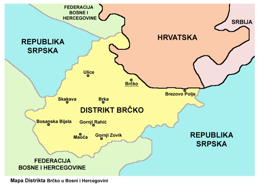Annex II
LAW ON PUBLIC ADMINISTRATION
OF BRCKO DISTRICT OF BOSNIA AND HERZEGOVINA
I BASIC PROVISIONS
Article 1
(Subject Matter)
This law shall regulate the basis of the Public Administration of Brcko District of Bosnia and Herzegovina (hereinafter: the District) related to establishing, organizing, position, role, competences and duties of the District Public Administration as well as other issues of importance to the organization and work of the Public Administration.
Article 2
(Public Administration Composition)
District Public Administration (hereinafter: the Public Administration) shall be composed of: District Government Departments (hereinafter: the Departments), Mayor’s Office, District Finance Directorate, Public Property Office and District Coordinator’s Office at the Council of Ministers of Bosnia and Herzegovina and other administrative bodies when provided so in the law.
Article 3
(Duties)
(1) Duties of the Public Administration shall be executed by the Public Administration bodies within their competence in accordance with the Brcko District of BiH Statute (hereinafter: the Statute), this law, laws and enactments of the Assembly of Brcko District of Bosnia and Herzegovina (hereinafter: the Assembly), laws of Bosnia and Herzegovina as well as the enactments of the Brcko District of BiH Government (hereinafter: the Government) and the Mayor.
(2) Public Administration bodies shall perform their duties independently and in accordance with the principles of legality, substantive truth, work transparency, professional impartiality, responsibility, political independence, efficiency and cost effectiveness.
(3) Certain duties of the Public Administration may also be performed by public companies and other legal persons if the competences of the Public Administration are transferred to them.
Article 4
(Basic Principles of the Public Administration)
(1) Public Administration bodies, within their competences, shall ensure efficient and full implementation of citizens’ rights and freedoms stipulated by the Constitution of Bosnia and Herzegovina (hereinafter: the Constitution) and the Statute.
(2) General principles, standards and rules of ethics for the employees of Public Administration bodies shall be prescribed by the law.
(3) Employment in Public Administration bodies shall be conducted based on professional qualifications, through an open vacancy procedure and shall reflect the composition of the population in accordance with the Statute and the law.
Article 5
(Language and Alphabet)
(1) In Public Administration bodies the Serbian, Bosnian and Croatian shall be equally used as the official languages.
(2) Official alphabets in Public Administration bodies shall be Cyrillic and Latin.
Article 6
(Responsibility for Damage)
(1) In accordance with the law, District shall be responsible for the damage that a Public Administration body caused by illegal work performance to a natural or legal person.
(2) District shall be entitled to request from a servant or employee compensation for the amount paid for the damage caused due to his/her illegal work performance.
II ESTABLISHING AND BASIS OF INTERNAL ORGANISATION OF PUBLIC ADMINISTRATION BODIES
Article 7
(Establishing Public Administration Bodies)
(1) Public Administration bodies shall be established by the law.
(2) Statute and this law shall regulate and ensure full and rational work performance by Public Administration bodies as well as the efficient execution of duties and exercise of rights of citizens and legal persons.
(3) Public Administration bodies shall be established in accordance with the principles of classification of duties per type, affinity, mutual connection and the needs for efficient work management and provision of independence in the course of work.
Article 8
(Basis of Internal Organisation of Public Administration Bodies)
Organisational Plan of the Public Administration bodies shall define:
a) Principles of internal organisation of Public Administration bodies;
b) Organisational units;
c) Management;
d) Name and distribution of positions as per organisational units with terms of references for Public Administration body managers, servants with managerial responsibilities, servants and employees.;
e) Criteria regarding educational qualifications and other criteria for performance of duties;
f) Number of servants and employees;
g) Salary grade of a position
h) Other work related issues of the District Public Administration bodies.
Article 9
(Internal Organisation Principles)
(1) Internal organisation of Public Administration bodies shall be based upon the principle of rational and efficient work performance by Public Administration bodies and the principle of ensuring expert work performance by Public Administration bodies.
(2) With the aim of implementing the principles stipulated in the provision in Paragraph 1 of this Article Public Administration bodies shall be organized in lower organisational units thus ensuring rational work organisation, efficient work performance, successful management of a Public Administration body as well as classification of duties in accordance with their nature, type, volume, level of complexity and the manner of performance.
III PUBLIC ADMINISTRATION DUTIES
Article 10
(Common Provisions)
Public Administration bodies shall perform the following duties within their competence:
a) implement laws, other regulations applied on the District’s territory;
b) monitor the situation in the areas they have been established for and recommend measures in those areas;
c) act upon administrative matters;
d) perform administrative supervision and other administrative duties;
e) prepare and recommend regulations from the area they have been established for;
f) perform other duties stipulated by the law;
Article 11
(Types of Enactments of Public Administration Bodies)
When performing duties form Article 10 of this law, Public Administration bodies shall enact general enactments (normative legal enactments), individual enactments (administrative enactments and other individual enactments) and substantive enactments (simple administrative operations and expert operations) in accordance with the Statute, law and other regulations.
Article 12
(Implementation of Laws and Other Regulations)
Public Administration bodies shall implement laws and other regulations in the administrative procedure, administrative supervision and other duties under their competence.
Article 13
(Monitoring and Recommendation of Measures)
Public Administration bodies shall be responsible for permanent monitoring in the areas for which they have been organised, for complete and up to date data and information and for professional validity of the situation evaluations, occurrences and initiatives for resolving issues from that area.
Article 14
(Acting Upon Administrative Matters)
Public Administration bodies shall act upon administrative matters through direct application of regulations, decide upon rights, obligations and law-based interests of citizens and legal persons, conduct the procedure and perform duties for which they are authorised by the law.
Article 15
(Administrative Supervision)
Public Administration bodies shall perform administrative supervision over legality of enactments used in administrative matters on rights and duties of the legal subjects, supervision over legality of performance of legal entities and inspection supervision, if authorised by the law and other regulations.
Article 16
(Preparation and Recommendation of Regulations)
Public Administration bodies shall prepare and propose regulations and other general enactments in accordance with general policy of the District and District Government work programme as well as on their own initiative from the area they have been established for.
Article 17
(Performance of Other Expert Duties)
Public Administration bodies shall draft analytical, informative and other materials for the Assembly, Government and the Mayor and in that shall cooperate with expert and scientific organisations when application of special expert and scientific methods is required in the drafting process.
Article 18
(Transparency of Work)
Public Administration bodies shall ensure transparency of work in accordance with the law through provision of information to the media, issuance of official publications and provision of conditions for undisturbed information sharing with the public on performance of duties under their competence.
IV COMPETENCES OF PUBLIC ADMINISTRATION BODIES
Article 19
(Competences of the Mayor’s Office)
Mayor’s Office shall be in charge of:
a) Management of Mayor’s, Deputy Mayor’s and Chief Government Coordinator’s duties;
b) Government public relations;
c) Government administrative support;
d) Legal affairs;
e) Public Administration reform;
f) Acting upon citizens’ complaints;
g) Inspection duties;
h) Second instance administrative procedure;
i) Implementation of employment procedure within Public Administration bodies
j) Legislature;
k) European integration;
l) Monitoring and undertaking measures in the implementation of general principles, standards and rules of ethics for civil servants and employees.
Article 20
(Department of Administrative Support)
Department of Administrative Support shall be in charge of:
a) Relations with the associations, foundations, non-governmental organisations and local communities;
b) Ensuring IT system operations in the District Public Administration
c) Implementation of public procurement procedure;
d) Human resources management in Public Administration bodies;
e) and other duties under the competence of the Department defined by the law and regulations.
Article 21
(Department of Spatial Planning and Property Affairs)
Department of Spatial Planning and Property Affairs shall be in charge of:
a) Spatial and urban planning;
b) Issuance of urban approvals, extracts and other enactments under the competence of the Department;
c) Environment protection and ecological permits;
d) Legalisation of illegal structures;
e) Property affairs;
f) Protection of structures of historical and cultural importance and natural heritage from the aspect of issuance of urban approvals and determining the procedure for the protected structures list;
g) Other duties under the competence of the Department defined by the law and other regulations;
Article 22
(Department of Economic Development, Sports and Culture)
Department of Economic Development, Sports and Culture shall be in charge of:
a) Statistics and analysis, strategic planning and regional cooperation;
b) Business initiatives and services, marketing and public relations and measures for investment promotion;
c) Implementation of privatisation process of the state capital of companies in the District;
d) Theatres, galleries, cultural associations, events and the library;
e) Sports and tourism;
f) Other duties under the competence of the Department defined by the law and other regulations;
Article 23
(Department of Public Works)
Department of Public Works shall be in charge of:
a) Maintenance of town streets, village roads, parks and other public areas in the District;
b) District public property maintenance;
c) Government vehicle fleet management;
d) Organisation and functioning of public traffic and transportation in the District;
e) Activities regarding purchase of apartments in accordance with the Law on Purchase of Apartments over which there’s an Occupancy Right in Brcko District of BiH;
f) Other duties under the competence of the Department defined by the law and other regulations;
Article 24
(Department of Utilities)
Department of Utilities shall be in charge of:
a) developing the policy, strategy and legal framework for managing electricity supply, water supply and gas supply;
b) developing the policy, strategy and legal framework for managing the treatment of solid waste and waste waters;
c) managing and further development of street lighting system;
d) monitoring the pricing policy of utility services;
e) planning, preparation and running of capital investments in the field of utility infrastructure;
f) and other affairs under the competence of the Department set by law and other regulations.
Article 25
(Department of Health Care and Other Services)
Department of Health Care and Other Services shall be in charge of:
a) Prevention and health care to the population and functioning of District health care institutions;
b) Citizens’ welfare and protection;
c) War veterans’ issues, war invalids and civilian war victims;
d) Other duties under the competence from the Department defined by the law and other regulations;
Article 26
(Department of Education)
Department of Education shall be in charge of:
a) Preschool and primary education and upbringing;
b) Secondary general and vocational education;
c) Support to District educational institutions;
d) Material-technical, personnel and expert-pedagogical support to educational institutions of BiH;
e) Curricula, professional development programmes for teachers and teaching associates and expert-pedagogical supervision;
f) Other duties under the competence of the Department defined by the law and other regulations;
Article 27
(Department of Agriculture, Forestry and Water Management)
Department of Agriculture, Forestry and Water Management shall be in charge of:
a) Improvement and development of agriculture, forestry, animal breeding, hunting and fishing;
b) Regime, use, utilisation and protection of waters and stream flows;
c) Agro-industry;
d) Veterinary activity;
e) Protection and improvement of forests;
f) Rural development;
g) Other duties under the competence of the Department defined by the law and other regulations;
Article 28
(Public Records Department)
Public Records Department shall be in charge of:
a) Issuance of personal identification documents;
b) Maintenance and upgrade of public records and archives;
c) Maintenance of land cadastres and public records;
d) Issuance of extracts from records;
e) Registrar’s records keeping;
f) Registration and cancellation of citizens’ residence and temporary residence;
g) Motor vehicles’ registration
h) Office operations and verification of signatures, statements, documents and contracts;
i) Other duties under the competence of the Department defined by the law and other regulations;
Article 29
(Department of Displaced Persons, Refugees and Housing Issues)
Department of Displaced Persons, Refugees and Housing Issues shall be in charge of:
a) Implementation of laws and regulations of competent in the filed of housing affairs, property and housing issues of refugees and displaced persons.
b) Solving property rights of owners, occupancy right holders and the right to alternative accommodation by refugees and displaced persons;
c) Repossession by owners and occupancy right holders;
d) Maintenance of the housing fund owned by the District;
e) Providing housing for the social welfare categories of the District population;
f) Preparation and implementation of the reconstruction programme for private and state owned housing units;
g) Other duties under the competence of the Department defined by the law and other regulations;
Article 30
(Department of Public Safety)
Department of Public Safety shall be in charge of:
a) Preventive actions and rescuing people and assets endangered by: fire, accidents, floods, traffic accidents;
b) Civilian protection and protection from natural disasters;
c) Demining, removal and destruction of unexploded ordinances;
d) Reconnaissance;
e) Issuance of construction permits and use permits;
f) Issuance of decisions on meeting the criteria for performance of activities by natural and legal persons;
g) Issuance of approvals for private transportation businesses.
h) Issuance of decisions for technical control over project documentation;
i) Certification of the condominium ownership plan;
j) Calculation of bill of quantities of the land, lease and taxes;
k) Issuance of decisions on meeting the criteria for natural and legal persons in the field of development of technical documentation and construction;
l) Other duties under the competence of the Department defined by the law and other regulations;
Article 31
(District Finance Directorate)
(1) District Finance Directorate shall be comprised of:
a) Director’s Office,
b) Treasury,
c) Tax Administration.
(2) District Finance Directorate shall be in charge of collection and allocation of public revenues and other duties stipulated by a separate law.
Article 32
(Public Property Office)
Public property office shall be in charge of implementation of laws and other regulations in administering the public property of the District.
Article 33
(District Coordinator’s Office at the Council of Ministers of Bosnia and Herzegovina)
District Coordinator’s Office at the Council of Ministers of Bosnia and Herzegovina shall be in charge of representation of District’s interests before the institutions of Bosnia and Herzegovina.
V MANAGEMENT OF PUBLIC ADMINISTRATION BODIES
Article 34
(Public Administration Bodies Management)
Public Administration bodies shall be managed by the Mayor, heads of departments, Finance Directorate Director, Public Property Office Director and District Coordinator’s Office at the Council of Ministers of Bosnia and Herzegovina.
Article 35
(Servant with Managerial Responsibilities)
(1) Servants with managerial responsibilities shall manage internal organisational units within the Public Administration bodies defined by organisational plans.
(2) Organisational plan of the Public Administration bodies shall define competences and positions of servants with managerial responsibilities.
(3) In performance of entrusted duties the servant with managerial responsibilities shall be obliged to:
a) organise the work of an organisational unit and ensure efficient, professional and lawful performance of organisational unit duties.
b) assist the Public Administration body manager, i.e. his/hers immediate supervisor in managing the work in the organisational unit’s field of work.
c) monitor the work of servants and employees in the organisational unit and report to the Public Administration body manager on the results achieved in their and his/her work.
Article 36
(Deputy Manager)
If the Public Administration body manager is unable to perform his/her duty he/she shall be deputised by the servant with managerial responsibilities as stipulated by the Organisational Plan in accordance with the law.
Article 37
(Transfer of Competences)
(1) Public Administration body manager may transfer competences to the servant with managerial responsibilities and other servants in accordance with the law.
(2) Transfer of competences shall be done in writing which does not relieve the Public Administration body manager, who transferred competences as stipulated in Paragraph 1 of this Article, from responsibility.
Article 38
(Servants with Special Authorisations)
Inspection supervision and other important administrative and expert duties prescribed by the law and Organisational Plan shall be performed by inspectors as well as servants with special authorisations and responsibilities (hereinafter: servants with special authorisations).
Article 39
(Responsibility of Public Administration Body Manager, Deputy and Servants with Managerial Responsibility)
Public Administration body manager as well as the servant with managerial responsibility shall be personally responsible for execution of entrusted duties as well as for the work of the body i.e. organisational unit under their management in accordance with the Statute and the law.
VI ENTRUSTING PUBLIC COMPETENCES
Article 40
(Entrusting and Transfer of Public Competences)
Legal persons, by way of the law, may be entrusted or transferred with conducting of certain administrative and expert duties under the competence of a Public Administration body, so that within their field of work they decide about individual matters, certain rights and duties of citizens and legal persons (hereinafter: Institutions with Public Competences).
VII PUBLIC ADMINISTRATION BODY RELATIONS WITH THE ASSEMBLY, GOVERNMENT AND MAYOR, MUTUAL RELATIONS IN PUBLIC ADMINISTRATION BODIES
Article 41
(Public Administration Body Relations with the Assembly)
(1) Public Administration body relations with the Assembly shall be based on rights and duties prescribed by the Statute and this law.
(2) Public Administration bodies shall be obliged at the request of the Assembly, Government or Mayor to provide answers to all questions related to implementation of laws in the field under their competence as well as about the situation and problems in the field for which those bodies have been established.
Article 42
(Relations of Public Administration Bodies with the Government and Mayor)
Public Administration bodies shall submit reports on their work to the Government and the Mayor in accordance with the law.
Article 43
(Mutual Relations in Public Administration Bodies)
(1) Mutual relations in Public Administration bodies shall be based on cooperation, information sharing and agreements.
(2) Mutual cooperation of Public Administration bodies shall provide for efficient work of the Public Administration.
(3) In the implementation of mutual cooperation Public Administration bodies shall be obliged, within prescribed deadlines, to mutually deliver and exchange data and information required for performance of duties they have been established for as well as the duty of advising on issues from their scope of work.
Article 44
(Competences of Several Public Administration Bodies)
In cases which several administration bodies are in charge of, managers of those bodies shall be obliged to agree on which Public Administration body shall have coordinating role or shall request the Mayor to decide about it.
Article 45
(Working Bodies)
(1) With the aim of resolving complex cases the Mayor shall be authorised to form a working body.
(2) The Mayor’s enactment by way of which the working body is formed, as stipulated in Paragraph 1 of this Article, shall also stipulate appointment of the working body coordinator who shall organise the work of the working body.
Article 46
(Public Administration Bodies Relations with the Administration Bodies of
Bosnia and Herzegovina and Entities)
Public Administration bodies shall cooperate with the administration bodies of Bosnia and Herzegovina and Entities in accordance with the law and other regulations.
VII PUBLIC ADMINISTRATION BODIES’ RELATIONS WITH CITIZENS AND LEGAL PERSONS
Article 47
(Public Administration Bodies’ Relations with Citizens)
(1) Public Administration bodies shall act upon citizens’ requests within legally prescribed deadlines.
(2) In performance of duties from the field under their competence, Public Administration bodies shall make direct contacts with the citizens in order to act upon their rights and duties, shall organise duties of importance to implementation of citizens’ rights and duties the in the way and under conditions facilitating citizens to exercise their rights and execute their duties with those Public Administration bodies in the simplest, quickest and most efficient way.
Article 48
(Citizens’ Treatment)
(1) Working with citizens servants and employees shall be polite and shall carefully consider citizens’ needs and issues in order to help them.
(2) Working with the handicapped, old, pregnant women and parents with small children, servants and employees shall treat them with priority.
Article 49
(Public Administration Bodies’ Relations with Legal Persons)
Public Administration bodies, within their competence, shall have authorisations and duties prescribed by the law towards legal persons especially regarding supervision over legality of work performed by those legal persons.
Article 50
Cooperation with Legal Persons
(1) Public Administration bodies shall cooperate with legal persons with regards to the matters under their own competence which are relevant for the work of the Public Administration bodies or are in the interest of work of legal persons.
(2) At the request of Public Administration bodies legal persons shall be obliged, in accordance with the law, to deliver data and information relevant for implementation of legally stipulated competences of Public Administration bodies.
Article 51
(Complaints)
(1) Clients may file complaints with regards to the work of Public Administration bodies.
(2) Complaint procedure shall be prescribed by a separate Rulebook enacted by the Mayor.
Article 52
(Obtaining Documents)
(1) Public Administration bodies shall not request from clients, in the administrative procedure matters, to submit certificates and other public documents regarding the facts for which Public Administration bodies or institutions with public competences have official records.
(2) Certificates and documents referred to in Paragraph 1 of this Article, the Public Administration body, i.e. the institution with public competences shall obtain ex officio and within legally prescribed deadline.
Article 53
(Application of Provisions)
Provisions of Articles 47 to 52 of this law shall be accordingly applied to institutions with public competences when acting upon the rights and duties of citizens and legal persons in the course of implementation of public competences.
IX INSPECTION SUPERVISION
Article 54
(Common Provisions on Inspection Supervision)
(1) Inspection supervision shall be conducted by inspectors.
(2) A person meeting criteria prescribed by a separate law may be appointed as an inspector.
Article 55
(Initiation of Inspection Supervision Procedure)
Inspection supervision procedure shall be initiated and run by inspector ex officio in accordance with the separate law regulating inspection supervision in certain areas, which shall apply to all other issues related to the inspection supervision not regulated by this Law.
Article 56
(Administrative Inspection)
(1) Administrative inspection supervising implementation of this law, the law referring to servants and employees, administrative procedure and special administrative procedures as well as office operations, shall be conducted by the Administrative Inspector.
(2) A graduate lawyer who passed a Public Administration exam and has minimum 5 years of working experience in the most complex administrative affairs may be appointed as the Administrative Inspector.
Article 57
(Administrative Inspector’s Competences)
When performing inspection supervision over implementation of laws and other enactments the Administrative Inspector shall supervise:
a) exercise of rights and legal interests and execution of duties of citizens, legal persons and institutions with public competences in the administrative procedure,
b) application of laws and enactments relating to the organisation of Public Administration bodies,
c) working relations within Public Administration bodies and fulfilment of working criteria by servants acting in administrative proceedings within institutions with public competences,
d) acting upon administrative issues within prescribed deadlines,
e) regularities in application of regulations in the administrative procedure,
f) the manner of collecting evidence in the administrative procedure,
g) implementation of administrative execution,
h) record keeping in administrative cases,
i) application of regulations on office operations,
j) other competences envisaged by a separate law.
Article 58
(Administrative Inspector’s Records)
(1) When performing inspection supervision the Administrative Inspector shall make records on completed inspection supervision containing the state of facts and description of irregularities and work deficiencies.
(2) Records of inspection supervision shall be signed by the manager of Public Administration body in which the inspection supervision has been performed and the Administrative Inspector.
(3) Copy of the records referred to in Paragraph 2 of this Article shall be submitted to the Public Administration body manager and on need bases to the Mayor.
Article 59
(Administrative Inspector’s Duties)
(1) If the Administrative Inspector in the process of inspection supervision establishes that a violation of law or other enactment constitutes a breach of duty, committed offence or a crime, he/she shall be obliged, without delay, to file request for establishing accountability based on breach of duty, committed offence or a crime.
(2) Administrative Inspector may temporarily seize documents and items which in disciplinary, offence or criminal proceedings may serve as evidence and he/she shall issue a receipt upon seizure of documents or items.
(3) If Administrative Inspector in inspection supervision establishes that the law or other enactment was violated he/she shall enact a decision instructing measures with the aim of eliminating deficiencies.
(4) Administrative Inspector’s decision shall be final in the administrative procedure unless otherwise prescribed by a different law.
Article 60
(Duties of Public Administration Bodies)
(1) Public Administration bodies and institutions with public competences shall enable the Administrative Inspector to perform inspection supervision and provide him with all required data and information with regards to the supervision.
(2) Public Administration bodies and institutions with public competences subjected to inspection supervision shall act upon Administrative Inspector’s decision enacted in accordance with Paragraphs 3 and 4, Article 59 of this Law.
(3) Every failure to act upon Administrative Inspector’s decision shall be deemed as offence i.e. serious breach of duty in accordance with the separate law.
Article 61
(Citizens’ and Legal Persons’ Rights to Address Administrative Inspector)
(1) Citizens and legal persons shall have the right, with the aim to protect their rights stipulated by this and other law and enactment, to address the Administrative Inspector verbally or in writing in the following cases:
a) if their requests or appeals in the administrative procedure are not acted upon within legally prescribed deadline,
b) if they are requested in the administrative procedure to prove facts by way of certificates and other documents which a servant is obliged to obtain ex officio.
c) if the administrative enactments for exercise of rights and legal interest in the administrative procedure are not implemented.
(2) Pursuant to Paragraph 1 of this Article the Administrative Inspector shall, without delay, exercise inspection supervision, make records in accordance with provisions of the Law on Administrative Procedure of Brcko District of BiH and undertake appropriate measures and inform the applicant in writing accordingly, within 8 days and not later than 30 days upon receiving the application
X WORK FUNDS FOR PUBLIC ADMINISTRATION BODIES
Article 62
(Common Provisions)
(1) Public Administration bodies’ work funds shall be provided in the District budget.
(2) Funds generated by Public Administration bodies in exercising their competences shall be the budget revenues in accordance with the law.
XI PENALTY PROVISIONS
Article 63
(1) A legal person, entrepreneur and institutions with public competences shall be fined from 2000KM to 8000KM if:
a) they fail to deliver report, data and information from their scope of work at the request of a Public Administration body ( Article 50, Paragraph 2),
b) they fail to act upon client’s request within a prescribed deadline (Article 47, Paragraph1),
c) they fail to, ex officio, obtain certificates and other public documents on the facts contained within official records or if they request from clients to submit those certificates and public documents (Article 52),
d) they fail to act upon preventive measures or Administrative Inspector’s decision (Article 60),
e) they unable the Administrative Inspector to perform inspection supervision and do not provide him/her with necessary data and information (Article 60, Paragraph 1),
f) they unable or make it difficult for citizens and legal persons to exercise their rights and legal interests (Article 61),
(2) For offence referred to in Paragraph 1 of this Article, a person responsible within the Public Administration body, legal person or institution with public competences shall be fined from 200 KM to 1,000 KM.
Article 64
(1) Company, entrepreneur and an institution with public competences shall be fined from 1000 KM to 4000 KM for an offence if they fail, within prescribed deadline, to submit to the Public Administration body requested data or enactments in relation to the administrative procedure, administrative supervision and monitoring of the situation in certain area.
(2) For the offence referred to in Paragraph 1 of this Article a person responsible within a Public Administration body, legal person or an institution with public competences shall be fined from 200 KM to 800 KM.
Article 65
(1) Responsible person within a Public Administration body shall be fined up to 500 KM if he/she fails to act in accordance with provisions from Article 12 in respect of Article 4, Paragraph 3, Article 46, Article 50, Paragraph 1, Article 48 and Article 5, Paragraph 3 of this law.
(2) A responsible person within a Public Administration body, in terms of this law, shall be the Public Administration body manager, inspector, authorised person within the legal person, institution with public competences as well as the public servant with managerial responsibilities, i.e. public servant in charge of implementing a certain action in accordance with the law, who failed to implement that action or has implemented it contrary to the legal provision.
Article 66
(Enforcement of Procedure)
(1) Offence proceedings as per provisions of this law shall be enforced by the Basic Court of Brcko District of Bosnia and Herzegovina.
(2) Funds from fines shall be paid into a single account of District Treasury and shall be District budget revenues.
XII INTERIM AND FINAL PROVISIONS
Article 67
(Harmonisation of General Enactments)
All general enactments of Public Administration bodies the provisions of which are contrary to this law shall be amended and harmonised with the aforementioned within 60 days from the day this Law enters into force.
Article 68
(Putting Out of Force)
By the effect of this law the Law on Administration of Brcko District of BiH shall be put out of force (“Official Gazette of Brcko District of BiH, no. 31/04).
Article 69
(Entering into Force)
This law shall enter into force on the 8th day of its publishing in the “Official Gazette of Brcko District of BiH”.










